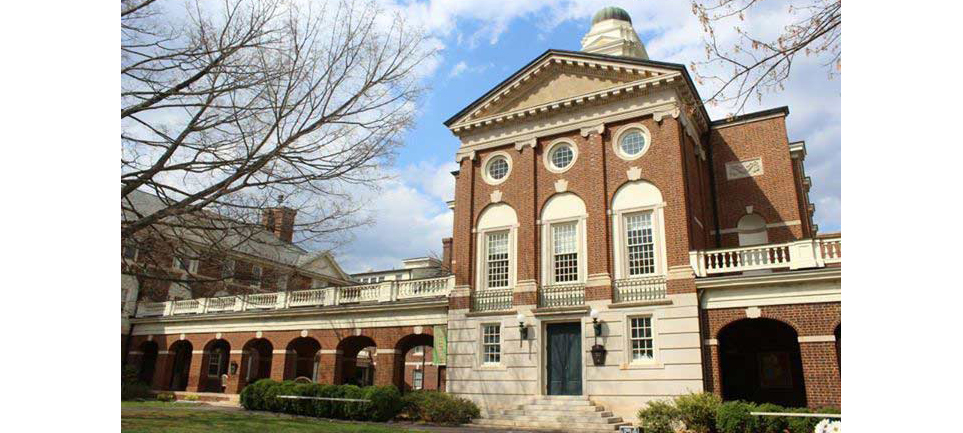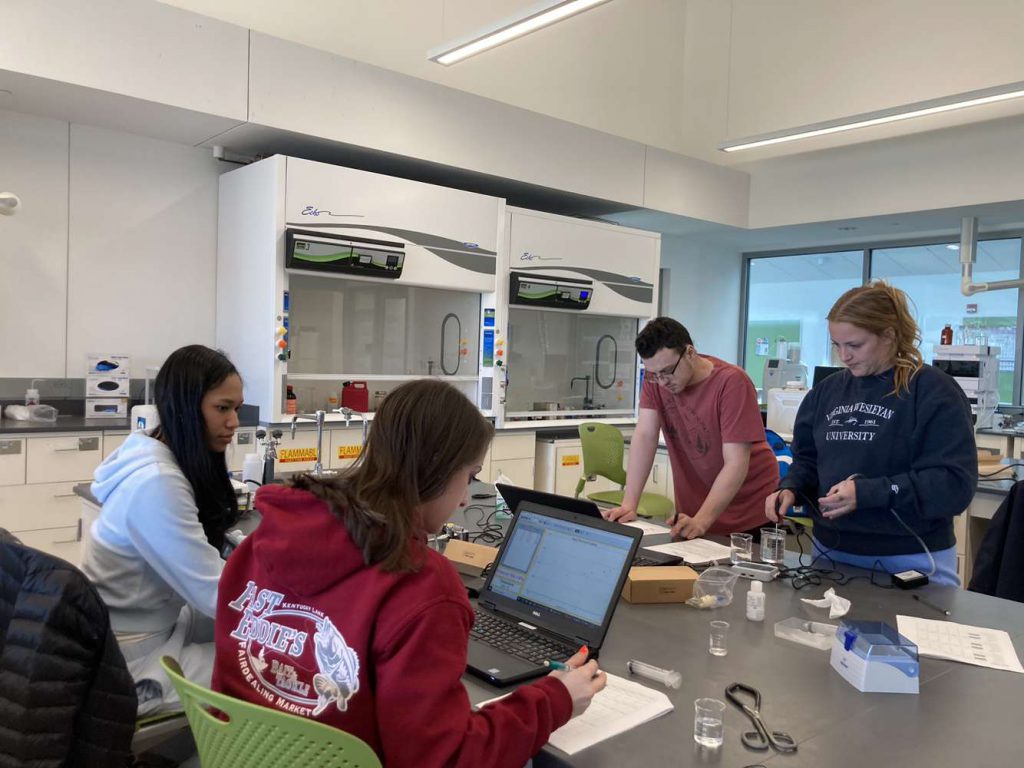JESSICA HAUSER
Staff Writer
Virginia Wesleyan College will reveal its new Veterans Memorial in a public ceremony behind Godwin Hall on Nov. 11, Veteran’s Day, according to Veterans Affairs Certifying Official Melanie Monk.
Marguerite Vail, vice president for College Advancement, said that the $5,000 memorial “came out of a desire to honor those in the Virginia Wesleyan College family who served in the Armed Services of the United States and those who have lost their lives in service to this country.”
The coordinating committee for the project includes many different individuals, including Monk, David Garraty, professor of Management, Business and Economics, and David Buckingham, vice president for Student Affairs and dean of Enrollment Services. Also serving on the committee are Batten Professor of Art Philip Guilfoyle, Vice President of Operations Bruce Vaughan and 2012 VWC graduate Nicole Rust. Vail said the funding came from generous cash donations, while R. D. Lambert & Sons, Inc. donated time and materials to lay the foundation.
Rust, who is also a United States Navy veteran, first introduced the idea for the memorial after transferring from Palomar College in San Diego where a similar memorial stood to honor student veterans.
“While at Palomar, I met a group of veterans who quickly became paramount in helping me overcome obstacles with transitioning into the civilian world,” said Rust. “I credit those individuals for my strong drive to continue helping veterans overcome their individual obstacles, especially those enduring service connected injuries.”
Rust also established VWC’s veterans club and the Marlin Veterans Association in the spring of 2012, but there was not enough interest to keep the club active. This year, however, interest among Marlin veterans has increased.
Keith Mycek, a junior criminal justice major and transfer student from Tidewater Community College (TCC), was excited to learn about both the memorial and the club.
“I feel like other schools advertise directly to veterans,” said Mycek. “At TCC, there was a lot more awareness of other veterans on campus. There were activities and groups created around and for veterans. It makes for a better college experience.”
Mycek suffers from severe Post Traumatic Stress Disorder (PTSD) as well as a number of physical injuries including degenerative disk disorder, brachial plexopathy and scoliosis—all injuries sustained during his service as an infantryman in the United States Army.
“It’s ironic that I got injured,” said Mycek. “This is exactly why my parents didn’t want me to enlist. They discouraged me from enlisting, but I don’t regret it. I wouldn’t be able to pay for college without it.”
Although Mycek’s injuries occurred during his deployments to Iraq and Kuwait in support of Operation Iraqi Freedom and Operation New Dawn, the doctors who treated him while he was enlisted assumed he received minor injuries during a draw down as troops were preparing to return home from deployment, and prescribed muscle relaxers.
“I continued working, wearing body armor and carrying weapons while my back was ignored,” said Mycek.
It wasn’t until he returned from deployment that he learned the severity of his injuries. Mycek said that despite taking strong pain medications that had been prescribed to him, he eventually became unable to walk or even get out of bed. Finally, a civilian doctor examined his injuries and explained that he had herniated disks and severe fractures to his spine.
“The army didn’t do anything to help me,” said Mycek. “I did everything they told me to do with a broken back. Still, I feel lucky because many veterans are a lot more injured than I am.”
Mycek is a perfect example of the type of student Rust had in mind when she voiced her idea for the memorial and veteran’s club. She said her own experiences with the lack of awareness of the issues facing student veterans at VWC strengthened her desire to reach out to other veterans like herself and Mycek.
“At Palomar, the veteran community is very outspoken, well-known, respected and admired. The camaraderie is uncanny to what I experienced while on active duty,” said Rust. The memorial, she said, was an essential part of that camaraderie.
“I thought having our own space was essential to formulating camaraderie within the campus veteran community, to have a place where we could go, to talk or sit in silence with the comfort of knowing the man or woman to our left or right knew,” said Rust. “They understood what we were going through, because they were going through it too.”
“We’re readjusting to civilian life,” said Mycek. “We’re a good support group for each other. A lot of people are really insensitive to the issues we’re facing.”
Mycek said that although he has to take multiple medications to manage his PTSD and other injuries, he leaves class and takes them privately in order to avoid curiosity. He said some of the questions people ask him at school can be very hurtful.
“I use a cane now,” said Mycek. “But when I was in a wheelchair, people often said things like ‘What’s wrong with you?’, ‘Did you get blown up?’ and ‘How many people did you kill?’ It’s really hard to socialize and talk to people. I’m trying to actively contain PTSD, and people make it harder and don’t realize they’re being insensitive or rude.”
Rust had similar experiences during her time at VWC. She said that she once tried to contribute to a discussion in her anthropology class but was met with negative comments from some of the students around her. When she spoke of the injuries she had sustained during her service, which include seizures, autoimmune disorders and acute muscle weakness among others, one student said “That’s what you get for joining the f—ing army.”
She said she knew that the comment did not reflect the attitudes of all students, but that was when she realized how out of touch the military population is with the rest of the country. She decided then that something had to be done to provide a welcoming environment for veterans on campus.
“My motivation for establishing the Marlin Veteran’s Association was my need to serve,” said Rust. “[Veterans] need to be involved in some sort of service that benefits others and in return satisfies our need to see measurable results in something positive that we put effort into.”
Mycek said that his need to continue serving made it difficult to accept that he would no longer be able to deploy with his fellow soldiers.
“I feel responsible for their well-being and safety,” said Mycek. “I feel like I’m letting them down.”
Despite troubling experiences with some students, Mycek said his experience with VWC’s faculty and staff has been “stellar.”
“They bend over backward to help you,” he said. “Every person in every office has been able to accommodate me. Don’t be afraid to ask for help.”
Rust did ask for help in her mission to create a desirable environment for VWC veterans. She said that even though some of her experiences at VWC made her feel “isolated, misunderstood, outcast, anxious, and unwanted,” she is grateful to the staff members who helped her realize the Veteran’s Memorial and the Marlin Veteran’s Association.
“If it weren’t for Professor Dessouki, Professor Garraty, Dr. Ewell, Mrs. Pearson, and Mrs. Hill and their encouraging words, I very well may have left for a friendlier environment,” said Rust. “Melanie Monk and Teresa Rhyne, who are two very remarkable, strong and supportive women, helped me obtain informational assets to begin reaching out to fellow veterans and supporters on campus.”
The Veterans Benefit Office will hold a meet and greet for veterans interested in the Marlin Veteran’s Association on Oct. 3 from 11 a.m. to noon in the Schafer Room of the Boyd Dining Center.

